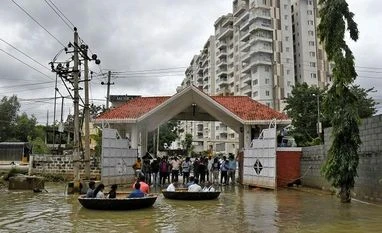Bengaluru has faced consecutive nights of relentless monsoon rains that have crippled transport and business operations on the city’s key Outer Ring Road (ORR), an area where big international firms such as Microsoft Corp, Intel Corp, Goldman Sachs Group Inc., and Morgan Stanley have offices.
Companies had to trigger emergency business continuity plans, allow work from home or pass on critical work to locations outside of Bengaluru, causing reputational damage and economic losses.
Home to over 10 million people, Asia’s Silicon Valley serves as a base for major outsourcing companies and dozens of prominent start-ups.
It is a popular hub for expatriates drawn to its moderate weather and cosmopolitan lifestyle.
But there are fears its technology (tech) capital image could be in deep water if the situation persists.
“With huge investments people have made in Bengaluru, if the city’s problems are not fixed, the Indian information technology (IT) sector will suffer. We have agreed to meet once every fortnight at the chief secretary level, to review suggested actions, converge on five/six actions, and build on a programme for execution,” said K S Viswanathan, vice-president (industry Initiatives), National Association of Software and Service Companies (Nasscom).
Bengaluru has been the heart and lungs of the $200 billion-plus IT services industry and a fast-growing start-up ecosystem. It is globally ranked sixth as the city with the highest number of unicorns, according to a recent Hurun Global Unicorn Index 2022.
But all this took a knock as the tech hub went under water after torrential rains set off long traffic snarls, widespread power cuts, and heavy floods swept into homes and submerged roads.
According to the ORR Companies Association, the downpour that started on August 30 impacted 500-600 companies that employ 1 million people.
This has led many to ask if Brand Bengaluru as India’s tech capital is watered down.
“Certainly not. I spoke to almost four/five large Fortune 500 firms that have offices in the city. None said this would make them move out of the state or the city. It’s an act of nature that is beyond our control,” said a senior IT services veteran based in Bengaluru, who is now an investor in start-ups.
Harish Bijoor, brand strategist and founder of Harish Bijoor Consults, said the image of Bengaluru has shaken and stirred somewhat, but it is a wake-up call for the city’s administrators.
“Thankfully the flooding is not everywhere; it has occurred in six locations of the city. The floods will not dampen investor sentiment. But investors will now insist their investee companies do due diligence when it comes to choosing office location,” he said, when asked if multinationals will rethink their investment strategy.
The sentiment is shared by some of the biggest brand strategists the country has.
Prahlad Kakkar, advertising guru and founder of Genesis Films, first visited Bengaluru 40 years ago and over the decades has seen the city metamorphose. He blamed the current situation on unrestrained development and climate change.
“Where does that leave Brand Bengaluru? The image of a cosmopolitan city that is welcoming to all has taken a bit of a beating in my view. The newer and affluent parts of the city were worst hit by the floods. But this is a problem that has plagued other cities in India, including Mumbai, another megapolis, where flooding is routine. The unchecked development will also have to be addressed seriously if Brand Bengaluru has to emerge again as a vibrant city.”
Prasoon Joshi, chief executive officer, McCann World Group India and Asia-Pacific chairman, who was in Bengaluru a fortnight ago, said the city once had a youthful and innovative joie de vivre.
“A brand will go through ups and downs, highs and lows. A brand is a story. The same goes for Bengaluru. While the floods have crippled city life for now and infrastructure problems are very real, I believe this city is resilient and will come out of this. I am a firm believer that Brand Bengaluru will bounce back and its people will overcome the challenges they are facing right now,” he added.
“Floods cannot wash away the brand equity of Bengaluru. If the flood waters recede in the next one week, the city will bounce back. However, if the problem persists and the recovery process is slow, it will impact its brand worthiness,” said Ambi Parameswaran, founder, brand-building.com.
On Wednesday, a consortium of 18 software companies, led by industry body Nasscom, met Karnataka officials, including state IT and BT Minister C N Aswathanarayana, to discuss the way forward.
Karnataka state officials have agreed to have IT sector participation in governance mechanisms planned for Bengaluru’s tech corridors at a meeting with industry stakeholders on Wednesday. The officials will hold a meeting with industry veterans to discuss plans once every fortnight.
What perhaps saved the businesses in the city was the work-from-home policy. Industry players said only 20-30 per cent employees were back in office.
“Many companies on ORR, where major brands are located, had to invoke the business continuity plan (a system to ensure business processes continue during a time of emergency). But the impact on business was minimal, with over 70 per cent of the workforce working from home,” said Viswanathan.
He added that the government could have created a helpline, perhaps even a portal to provide visibility and address the grievances on ongoing public projects.
Unlock 30+ premium stories daily hand-picked by our editors, across devices on browser and app.
Pick your 5 favourite companies, get a daily email with all news updates on them.
Full access to our intuitive epaper - clip, save, share articles from any device; newspaper archives from 2006.
Preferential invites to Business Standard events.
Curated newsletters on markets, personal finance, policy & politics, start-ups, technology, and more.
)